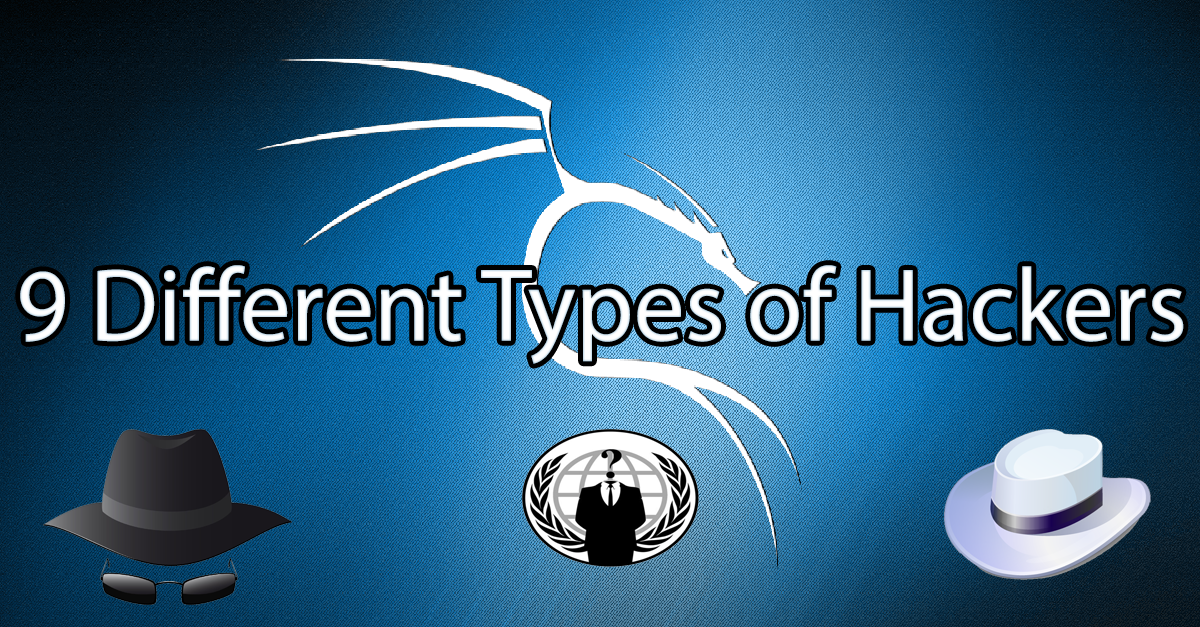[ePT news] Types of hackers
 •
by
•
by Jimkats1
We will continue the series of random articles with the 9 Different Types of Hackers and their differences, according to this article from K4linux : Linux Tutorials.
It may be an off-game article, but I think it could be useful to be entertained.

1. Black Hat Hacker
A black hat hacker is a hacker who violates computer security for little reason beyond maliciousness or for personal gain. The black hat hacker takes advantage of the break-in, perhaps destroying files or stealing data for some future purpose. The black hat hacker may also make the exploit known to other hackers and/or the public without notifying the victim. This gives others the opportunity to exploit the vulnerability before the organization is able to secure it.

Their primary motivation is usually for personal or financial gain, but they can also be involved in cyber espionage, protest or perhaps are just addicted to the thrill of cyber crime. Black hat hackers can range from amateurs getting their feet wet by spreading malware, to experienced hackers that aim to steal data, specifically financial information, personal information and login credentials. Not only do black hat hackers seek to steal data, they also seek to modify or destroy data as well.
2. Grey Hat Hacker
Grey hat hackers are a blend of both black hat and white hat activities. Often, grey hat hackers will look for vulnerabilities in a system without the owner’s permission or knowledge. If issues are found, they will report them to the owner, sometimes requesting a small fee to fix the issue. If the owner does not respond or comply, then sometimes the hackers will post the newly found exploit online for the world to see.
The term "grey hat" refers to a computer hacker or computer security expert who may sometimes violate laws or typical ethical standards, but does not have the malicious intent typical of a black hat hacker.
3. White Hat Hacker
White Hat Hacker is a ethical computer hacker, or a computer security expert, who specializes in penetration testing and in other testing methodologies to ensure the security of an organization's information systems. White hat hackers choose to use their powers for good rather than evil. Also known as “ethical hackers”, white hat hackers can sometimes be paid employees or contractors working for companies as security specialists that attempt to find security holes via hacking.
White hat hackers employ the same methods of hacking as black hats, with one exception- they do it with permission from the owner of the system first, which makes the process completely legal. White hat hackers perform penetration testing, test in-place security systems and perform vulnerability assessments for companies. There are even courses, training, conferences and certifications for ethical hacking.
4. Suicide Hacker
Suicide hackers are those who hack for some purpose and even don’t bother to suffer long term jail due to their activities. Suicide hacker can be bad as well as good. Suicide Hacker will stop at nothing and will ignore consequences.
5. Script Kiddie
A Script Kiddie is basically a hacker amateur who doesn’t has much knowledge to program tools to breaks into computer networks. He often use downloaded hacking tools from internet written by other hackers/security experts. Script kiddies usually focus on the quantity of attacks rather than the quality of the attacks that they initiate.
A Script Kiddie is an unskilled individual who uses scripts or programs developed by others to attack computer systems and networks and deface websites. It is generally assumed that script kiddies are juveniles who lack the ability to write sophisticated programs or exploits on their own and that their objective is to try to impress their friends or gain credit in computer-enthusiast communities.
6. Spy Hacker
Spy hackers are individuals who are employed by an organization to penetrate and gain trade secrets of the competitor. These insiders can take advantage of the privileges they have to hack a system or network.
7. Cyber Terrorist
A Cyber Terrorist is a programmer who breaks into computer systems in order to steal or change or destroy information as a form of cyber-terrorism.
Cyberterrorism is the act of Internet terrorism in terrorist activities, including acts of deliberate, large-scale disruption of computer networks, especially of personal computers attached to the Internet, by the means of tools such as computer viruses.
8. State Sponsored Hacker
State sponsored hackers are individuals employed by the government to penetrate and gain top-secret information and to damage information systems of the governments.
9. Hacktivist
A hacktivist is kinda hacker who thinks hacking can bring out some social changes and hacks government and organizations to show his discomfort over some trivial issues.
Hacktivism is the subversive use of computers and computer networks to promote a political agenda. With roots in hacker culture and hacker ethics, its ends are often related to the free speech, human rights, or freedom of information movements.
Remember, those types aren't the official ones, they are just names used most times arround the Internet and not only. Official categories could be assumed the:
1. Black hat (the bad guys)
2. Grey hat (the neutral guys)
3. White hat (the good guys)


Comments
v
Θεωρώ πως είναι καλύτερο να γίνει ο χωρισμός των ειδών «χάκερ» σε δύο μεγάλες κατηγορίες: Αυτοί που λειτουργούν νόμιμα και αυτές που λειτουργούν παράνομα. Για προβληματισμό θέτω τις παρακάτω δύο ερωτήσεις:
1. Έστω πως είσαι διαχειριστής ή υπεύθυνος ασφάλειας Π.Σ. σε μια εταιρεία ή οργανισμό και αντιλαμβάνεσαι πως λειτουργεί ένα Rogue Access Point (φυτευτό AP για "κακό σκοπό") στα όρια της εταιρείας ή του οργανισμού.
Εάν (δεν μπορείς να το εντοπίσεις για να το ξηλώσεις και) κάνεις γιουρούσι (επίθεση DoS) σε αυτό με (π.χ. το "Murder Death Kill") για να το θέσεις εκτός λειτουργίας τί είσαι;
2. Είσαι κρατική υπηρεσία και χρησιμοποιείς «αθέμιτες» μεθόδους για να αποσπάς πληροφορίες από συστήματα χρηστών χωρίς την "permission from the owner of the system first". Π.χ. στη Ελλάδα το γνωστότερο honeypot για αυτό το σκοπό είναι το αθηναϊκό indymedia 😉 Αυτό τί σε κάνει; Σίγουρα όχι "White" ή " State Sponsored" Hacker σύμφωνα με τους ορισμούς.
Νιιι
Ψήφος